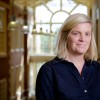This article is more than 5 years old.
Special Collections and Archives is pleased to announce the completion of the Wayne E. Oates papers. Thanks to the hard work of Cindy Good and Sarah Appleby, this 14 linear foot collection has been arranged and described, and the finding aid can be seen here. This collection contains the professional and personal papers, sermons, correspondence, and works from other authors compiled by Wayne Oates. Professional papers include lectures, outlines, presentations, bibliographies, research notes, and manuscripts of articles relating to the field of pastoral care and counseling.
ABOUT WAYNE OATES
Wayne Oates (1917-1999) produced an extensive, pioneering body of work and research in the field of pastoral care and counseling. Oates developed the “trialogue” form of pastoral counseling, described as a conversation between the person being counseled, the counselor, and the Holy Spirit. He is also responsible for coining the term “workaholic”.
Born into a rural community of Greenville, SC, Wayne Oates grew up in poverty. Abandoned by his father, he began working alongside his mother at the cotton mills at a young age. At 14, he was recognized as exceptional and chosen to serve as a page in the United States Senate. He would go on to pursue much more education; he was a graduate of Mars Hill Junior College and Wake Forest University, and received his Ph.D. in Psychology of Religion from Southern Baptist Theological Seminary. He served as a pastor in churches in North Carolina and Kentucky.
In 1974, Oates joined the faculty at the University of Louisville Medical School. Combining his knowledge of theology and behavioral science, his role at the school helped medical students learn how to incorporate the spiritual needs of their patients in a clinical setting. Noted for his great compassion and ability to empathize, Wayne Oates mentored and encouraged numerous people in healing positions. In 1984 the American Psychiatric Association honored him with the Oskar Pfister Award for his contributions to the relationship between religion and psychiatry.
He and his wife, Pauline, were residents of Louisville, KY until his death in 1999.

5 Comments on ‘The Wayne E. Oates Papers processing is complete!’
Fascinating life. I hope his materials get lots of use now that the finding aid is processed. Good work!
This is excellent news. I have been hearing about this collection for a long time!
This is an exciting collection, talked about for its research value for some time. Congratulations on your diligent work on a premier collection covering a transformative period of American religious life.
Excellent to hear!
YES! Great news — I know there will be a number of researchers interested in this collection!